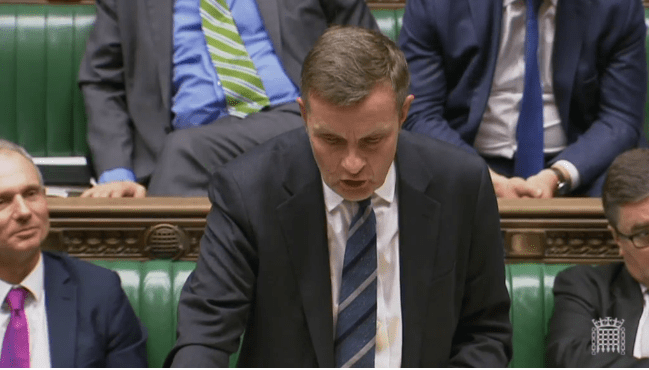Given Theresa May’s largely meaningless ‘Brexit means Brexit’ refrain, any new pronouncement on Britain’s departure from the EU is treated like gold dust. But Keir Starmer fell into the trap of thinking Brexit minister David Jones’ opening remarks today had offered up a bigger morsel than they actually had. Jones confirmed, as Theresa May has already made clear, that Parliament will vote on the Brexit deal. He said, too, that the vote would cover the future trading relationship between Britain and the EU, which had not previously been known. And the Commons was also told some more details on the timing of the vote, which will come, Jones confirmed, before the European Parliament gets its say on the final Brexit plan. Here’s what Brexit Minister David Jones said:
‘We intend that the vote will cover not only the withdrawal arrangements but also the future relationship with the European Union. Furthermore, I can confirm that the Government will bring forward a motion on the final agreement to be approved by both Houses of Parliament before it is concluded, and we expect and intend that this will happen before the European Parliament debates and votes on the final agreement.’
Starmer – who spoke of Labour’s Brexit pain last week – described the announcement as a ‘huge and very important concession’. This wasn’t quite true and as Ken Clarke, who was rather shrewder in his reaction said, MPs should be wary of ‘instantly leaping on’ a concession. In reality, Jones’ announcement was less a concession than a cover for Tory MPs to now fall back into line. In making it clear Parliament will have a full say on the final Brexit deal, the Government is hoping it can stave off a rebellion for now and ensure that the fringe of backbench MPs considering voting against the Government today might be tempted not to do so. MPs were after a ‘meaningful’ vote on Brexit, and Ministers are hoping this announcement will offer them the fig leaf of respectability they need in order to convince them to come back on board.
Today’s session has also offered some clarification on what happens if MPs reject the Brexit deal. While some MPs – including the likes of Nick Clegg – are demanding that this should mean a return to the drawing board, the Government has said this will not be the case. Instead, Downing Street say it’s a clear decision for MPs to make: either vote for the deal, or end up with no deal at all. This seems sensible and fits with Theresa May’s comment that no deal is better than a bad deal. It’s also true, as David Jones pointed out today, that it would be an impossible sign of weakness for Ministers to be sent back on the Eurostar, with their tails between their legs, to work on making a deal if they’d previously walked away. The idea that such a scenario would result in a better deal seems difficult to imagine and instead looks like a ploy by Remain-backing MPs to hold things up.
But on the anniversary of Maastricht, Tory MPs are flinging mud at each other on this same point. Anna Soubry reacted angrily after clashing with John Redwood on whether Parliament should get its say in the event of ‘No deal’. Redwood said that such a scenario was exactly why the vote on the second reading last week had taken place and suggested Soubry should have voiced her opposition then. There are still some hours to go in this debate – and of course the votes on the amendments are yet to come. But what happens in the next few hours will tell us whether Theresa May will be able to keep her Brexit timetable on track. Anna Soubry, for one, has insisted she will still rebel. But Dominic Grieve has said he will fall into line. It seems safe to predict that any rebellion without the likes of Grieve on board is unlikely to merit the numbers to trouble the Government.







Comments